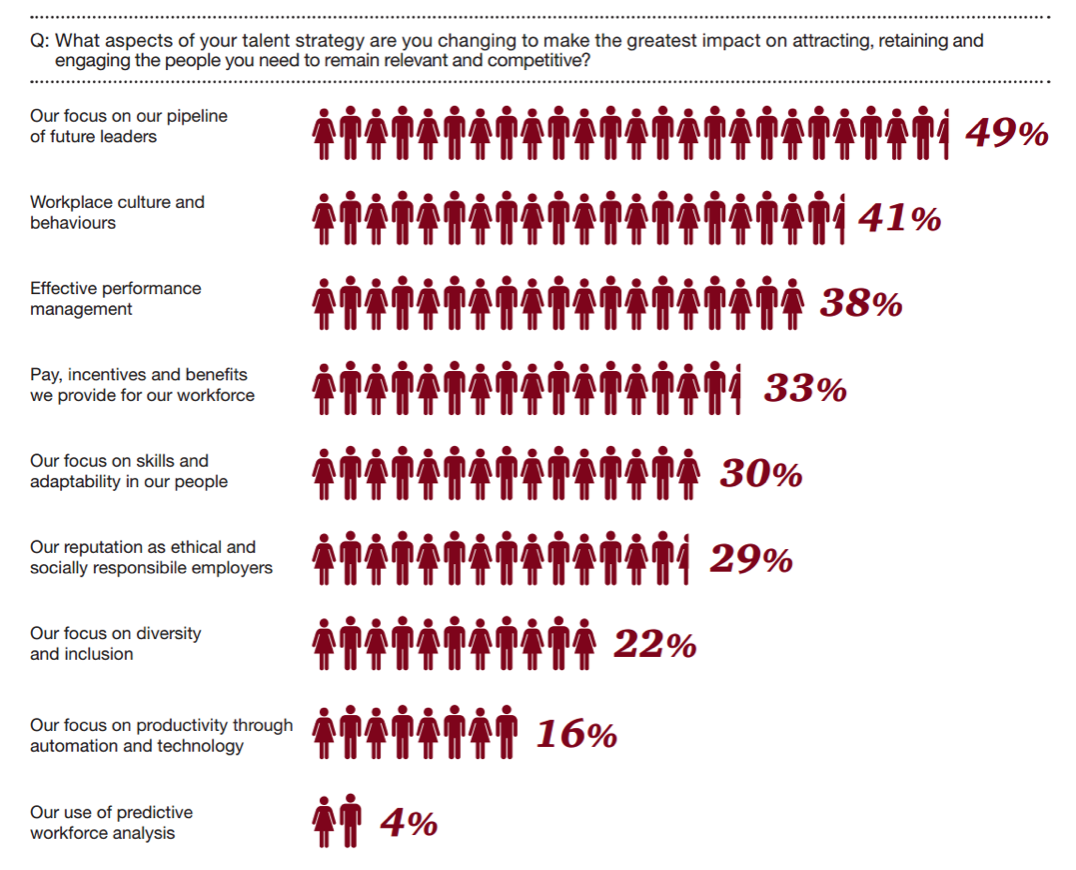The most successful HR departments fully support the employees of their company and act as a strategic asset for that company. Talented employees are the lifeblood of any organization, and, according to the 2016 PWC Global CEO study, the C suite is starting to recognize the importance of attracting and retaining top talent.

CEOs are recognizing the importance of talent, especially leadership talent, and the role that talent plays in the continued success of any company. They are also recognizing the need to manage the culture in which employees work, the need to manage/develop the performance of employees and the need to incentivize their workforce.
HR connects the C-Suite with the leaders and employees that they rely upon to handle crucial business functions. Let’s take a look at the elements that every company needs to create a successful HR department.
- Recruiting/Staffing
A company’s recruiting and staffing actions have a huge effect on that company’s performance. A new hire can affect everything from the culture of their department, to the tenure rates of their co-worker, to the success or failure of an important project. The fit has to be right for both the job and the company. HR departments compensate for difficult hiring conditions by doing workforce planning in advance of openings and anticipating the functional roles that will be required to execute upcoming company projects and initiatives.
- Payroll and Benefits
Successful HR departments have payroll running like clockwork and use a wide range of benefits to ensure that employees are happy and enjoying a positive work/life balance. Part of workforce planning is accounting for payroll increases, and successful HR departments stay up to date on the salary requirements for talent that is critical for their company.
Many companies employ a wide range of professionals, including contract labor, but, no matter what an employee’s relationship to a company, everyone likes to be paid on-time. When payroll is a mess, when people are consistently getting inconsistency, then you have a retention crisis in the making on your hands. Successful HR departments prioritize consistent payroll practices and make sure that all benefits are working for their employees.
- Culture/ Employee Development /Retention
The most effective HR departments understand the role that company culture, employee development and career opportunities play in employee engagement and retention. Nobody wants to feel at odds with their job or their company, and it’s the HR rep’s duty to create an inclusive company culture that makes everyone feel at home while at work.
Apart from feeling comfortable, HR leaders understand how important it is to motivate and develop employee talent. Offering resources for skill development will help to increase the productivity of employees and help to groom talented employees for more technical or senior positions. Additionally, having learning and skill development as a cornerstone of company culture is a big draw to talent.
Turnover will always be present for any employer, but successful HR departments conduct exit interviews with each outgoing employee to discover if there are any policies or people who are driving away their company’s talent. It’s all about creating an optimal environment for employees to work and grow their skills, and this results from an HR department that prioritizes skill development and a motivated company culture.
- Systems/Policies/ Procedures/Legal compliance
Successful HR departments have all of their ducks in a row when it comes to legal compliance and the systems, procedures and policies that ensure this compliance. Besides the dangers that legal trouble opens a business up to, the last thing you want is to develop a reputation for treating employees badly. This sort of reputation is a repellant to top talent, who have specific ideas about the sort of company they want to work for.
A successful HR department successfully protects their employees from harm or discrimination, and protects their employers from costly lawsuits and reputation damage.
- Risk is greater than you think
Engaged employees work harder, care more about the quality of their work, and stay with their employers for longer than disengaged employees. Unfortunately, research is showing that 70% of the workforce in the US is disengaged, meaning that the employers of these disengaged workers are receiving a largely reduced return on their investment.
Having a successful HR department is one of the most effective ways to combat this disengagement epidemic. 93% of employees want to work for a company that cares about them as an individual, and the support that employees receive from successful HR department help to meet this desire. Without properly supporting employees, you cannot expect these employees to remain loyal. A successful HR department means the difference between developing a world-class team and having a revolving door at your company.


